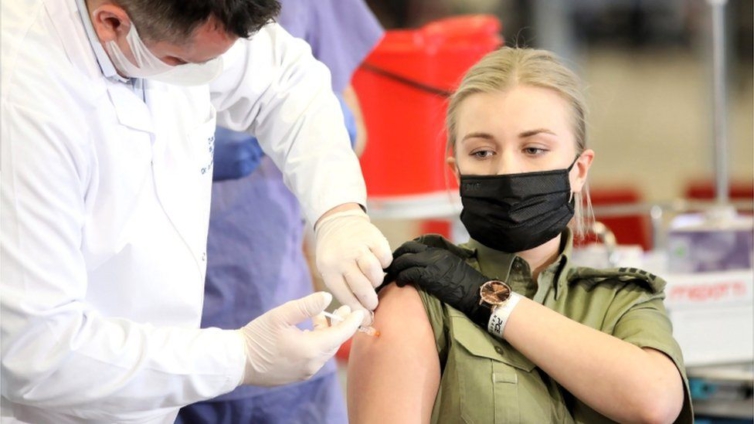European Union leaders are to hold virtual talks to discuss ways of boosting Covid vaccine supplies and improving the rollout of doses across the 27-nation bloc.
The European Commission will on Thursday ask leaders to support plans for added controls on vaccine exports, which could affect supply to the UK.
UK Prime Minister Boris Johnson earlier warned against imposing "blockades".
The virtual summit comes as a third wave of coronavirus infections sweeps across much of mainland Europe.
US President Joe Biden will also dial in to the talks later on Thursday to discuss EU-US relations.
The European Union's vaccine rollout campaign has been slower than that of the UK. The European Commission has blamed pharmaceutical companies - primarily AstraZeneca - for not delivering the promised doses to the EU.
However, leaders are divided over proposals for new restrictions on vaccine exports out of the bloc, which would aim to boost supplies within the EU.
A site in Belgium produces the Oxford-AstraZeneca vaccine, and another in the Netherlands is expected to increase supplies of the jab in the EU.
Brussels has said that of the more than 40 million doses exported from the EU over the past two months, a quarter were sent to the UK.
In a joint statement on Wednesday, the UK and the EU said they wanted to "create a win-win situation and expand vaccine supply for all".
"We are all facing the same pandemic and the third wave makes co-operation between the EU and UK even more important," the statement added.
While there have been suggestions that the proposals being put before EU leaders on Thursday would be focused on the UK and US in particular, EU Health Commissioner Stella Kyriakides said that this was not the case. "We're dealing with a pandemic and this is not seeking to punish any countries," he said.
Asked whether the UK might retaliate, Mr Johnson told MPs he did not believe "that blockades of either vaccines or of medicines, of ingredients for vaccines" would be "sensible". Companies might draw conclusions about future investments "in countries where arbitrary blockades are imposed", he added.
What is the EU planning?
The tougher export controls are most likely to affect vaccine-exporting countries that have higher vaccination rates than the EU, such as the UK and US.
The key criteria for the proposed regulations are "reciprocity" and "proportionality":
- The EU says there is no reciprocity if a country importing vaccines from the EU restricts exports itself - so it may review exports to this country
- Member states and the Commission will also consider the state of the pandemic in that country, its vaccination rate and vaccine supplies
There will be no outright export bans, which are opposed by countries such as the Netherlands and Belgium.
Vaccine manufacturers would be assessed to see if they were fulfilling their contract with the EU, although no specific algorithm is planned.
Is the UK being targeted?
In an interview with the BBC, the EU's Internal Market Commissioner Thierry Breton insisted the bloc's issues were with AstraZeneca and not the UK government. "I know that there's some tension... but as long as we have transparency, I think [relations] will be able to be normalised," he said.
He said if AstraZeneca had provided the agreed 120 million doses to the EU, member states would have been at the same rate of vaccination as the UK: "We have been heavily penalised and we just want to understand why".
AstraZeneca denies that it is failing to honour its contract with the EU.
A UK government spokesperson said: "We are all fighting the same pandemic. Vaccines are an international operation; they are produced by collaboration by great scientists around the world. And we will continue to work with our European partners to deliver the vaccine rollout."
Last week, European Commission President Ursula von der Leyen complained that the EU had exported more than 10 million doses to the UK, but the UK had so far exported none in return.
Her colleagues added that this had to be seen in the context of the EU being both a global Covid hotspot and also the biggest exporter of vaccines. Since the end of January, EU countries have exported 43 million doses of vaccine to 33 countries not subject to export authorisation, they say.
UK sources insist vital components are being sent to the continent, for example for the Pfizer vaccine, and they have emphasised the UK's role in investing early in vaccine development, BBC correspondent Nick Beake reports.
Latest Stories
-
Michael Baidoo joins Plymouth Argyle in record deal until 2028
14 minutes -
GPL 2024/25: Hearts beat Legon Cities to go second on league table
2 hours -
Ghana first science fiction movie goes global via MiSciFi
2 hours -
Attorney General embarrasses Ghana with bad GRA math at Tullow Arbitration
3 hours -
Kofi Boakye, Gbevlo-Lartey named in Mahama’s interim National Security team, Prosper Bani leads
3 hours -
USA President names delegation to attend Mahama’s inauguration ceremony
4 hours -
Deputy Foreign Affairs Minister denies demanding or taking $3,000 from accuser
4 hours -
Clerk to Parliament summons MPs for 1st sitting of 9th Parliament on midnight of 7th January
4 hours -
Nyantakyi was sabotaged – Asamoah Gyan claims
4 hours -
British woman and fiance found dead in Vietnam villa
5 hours -
Hapa Space, UNDP and MasterCard Foundation boost youth entrepreneurship at YIC Pitch Day
5 hours -
Kudus donates to Teshie Children’s Home and Rahman Basic School on New Year’s day
5 hours -
Gov’t urged to invest in helping children with special needs to unlock their potential
5 hours -
A single cigarette slashes 20 minutes off your life expectancy, UK research suggests
6 hours -
Sung Biela Foundation supports visually impaired brothers with education and business ventures
6 hours

